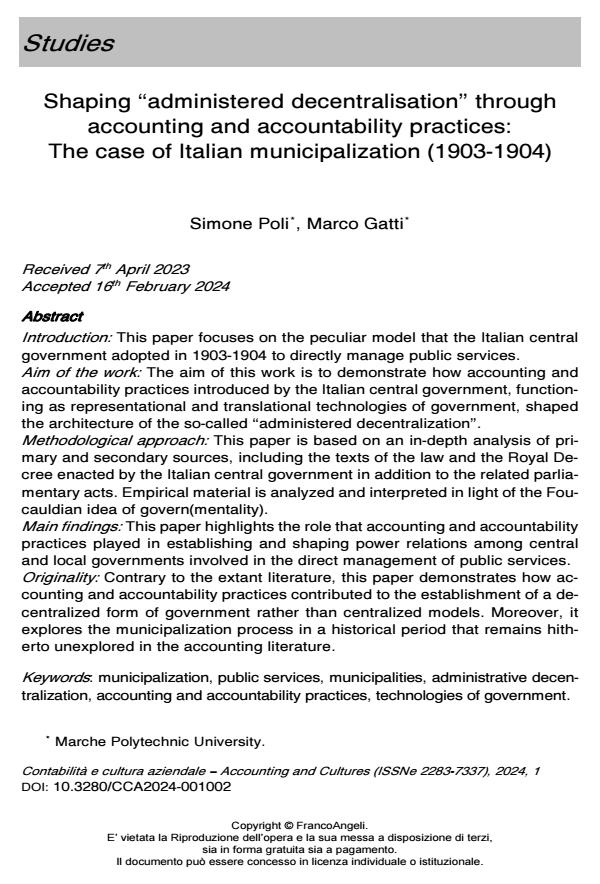Shaping “administered decentralisation” through accounting and accountability practices: The case of Italian municipalization (1903-1904)
Titolo Rivista CONTABILITÀ E CULTURA AZIENDALE
Autori/Curatori Simone Poli, Marco Gatti
Anno di pubblicazione 2024 Fascicolo 2024/1
Lingua Inglese Numero pagine 36 P. 7-42 Dimensione file 199 KB
DOI 10.3280/CCA2024-001002
Il DOI è il codice a barre della proprietà intellettuale: per saperne di più
clicca qui
Qui sotto puoi vedere in anteprima la prima pagina di questo articolo.
Se questo articolo ti interessa, lo puoi acquistare (e scaricare in formato pdf) seguendo le facili indicazioni per acquistare il download credit. Acquista Download Credits per scaricare questo Articolo in formato PDF

FrancoAngeli è membro della Publishers International Linking Association, Inc (PILA), associazione indipendente e non profit per facilitare (attraverso i servizi tecnologici implementati da CrossRef.org) l’accesso degli studiosi ai contenuti digitali nelle pubblicazioni professionali e scientifiche.
Introduction: This paper focuses on the peculiar model that the Italian central gov-ernment adopted in 1903-1904 to directly manage public services. Aim of the work: The aim of this work is to demonstrate how accounting and ac-countability practices introduced by the Italian central government, functioning as representational and translational technologies of government, shaped the archi-tecture of the so-called “administered decentralization”. Methodological approach: This paper is based on an in-depth analysis of primary and secondary sources, including the texts of the law and the Royal Decree enact-ed by the Italian central government in addition to the related parliamentary acts. Empirical material is analyzed and interpreted in light of the Foucauldian idea of govern(mentality). Main findings: This paper highlights the role that accounting and accountability practices played in establishing and shaping power relations among central and local governments involved in the direct management of public services. Originality: Contrary to the extant literature, this paper demonstrates how ac-counting and accountability practices contributed to the establishment of a decen-tralized form of government rather than centralized models. Moreover, it explores the municipalization process in a historical period that remains hitherto unex-plored in the accounting literature.
Parole chiave:municipalization, public services, municipalities, administrative decen-tralization, accounting and accountability practices, technologies of government.
Simone Poli, Marco Gatti, Shaping “administered decentralisation” through accounting and accountability practices: The case of Italian municipalization (1903-1904) in "CONTABILITÀ E CULTURA AZIENDALE" 1/2024, pp 7-42, DOI: 10.3280/CCA2024-001002